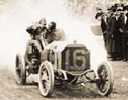Russell's Ramblings
by Russell Jaslow
How Will Hildebrand Overcome His Mistake?
5/30/11
Rochester, N.Y.—The sports world is littered with great collapses, mental gaffes, and blunders under pressure. However, most are forgotten unless they occur on the sport's biggest stage where they take on almost mythic proportions, remembered by the general public forever.
- Speed skater Dan Jansen, the clear favorite in the 500 and 1,000 meters at the 1988 Olympics, falls not once, hours after his sister passed away, but in both events while on gold medal pace. Then, in 1992 as the world record holder, he stumbles again, leaving Albertville without a medal.
- Jean Van de Velde had a three-stroke lead at the 18th tee in the 1999 British Open looking to become the first Frenchman to win it since 1907. Instead of playing it safe, he attacked the green and got himself into massive trouble, recording a triple-bogey for six strokes on the final hole, dropping him into a playoff which he subsequently lost.
- Jana Novotná led Steffi Graf in the third set of the 1993 Wimbledon final, 4-1, with a 40-15 lead in the sixth game, needing just five points to take the title. Then, Novotná double faulted, and it all went downhill from there, as the mistakes snowballed into a catastrophic collapse. When it was over, she was crying in the arms of the Duchess of Kent when presented with the runner-up trophy.
- In 1986 the Boston Red Sox were one strike away from winning their first World Series in 68 years. Then, the New York Mets started a rally which was completed when a routine, slow ground ball was hit to the first baseman. Bill Buckner, apparently glancing up to see where the runner was, has the ball roll under his glove to allow the winning run to score. The Mets won the next day in Game 7 to win the World Series.
Now, the 2011 Indianapolis 500 can be added to this inglorious list. JR Hildebrand, a rookie carrying the National Guard sponsorship on Memorial Day Weekend, was leading the race with one corner to go when he came upon a slower, lapped car. Instead of playing it safe and backing off, he immediately chose to pass around the outside, getting himself into the gray area of the track on an odd trajectory, causing the car to slide up into the wall. Despite momentum allowing him to continue down the front straightaway, Dan Wheldon passed him for the lead before Hildebrand crossed the finish line in second place.
How does an athlete overcome such a major, public mistake? How do they put it behind them when the highlight is shown over and over again ensuring it's immortality? How does one forget it when often the mistake gets integrated into popular culture?
Those are questions Hildebrand is going to have to answer in order to be able to continue to pursue a successful racing career.
The greatest relief pitcher in baseball history, Mariano Rivera of the New York Yankees, always says the key to success in his position is to have a short memory. Yet, despite the fact that Rivera has probably forgotten every blown safe he has ever suffered, he admits there is still one blown save he remembers and still gnaws at him -- Game 7 of the 2001 World Series, a loss helped by his own colossal fielding error.
Yet, ten years later Rivera continues to be the greatest closer in baseball history, helping the Yankees win another World Series in 2009.
Scott Pruett always said, even after winning a race, once the race is over, the stopwatches get reset to zero. You have to immediately begin to look towards the next race and not dwell on the one just completed, successfully or not.
Is forgetfulness good? Or, is learning from your mistakes just as important? Where is the line drawn between dwelling on an error and using it to make you stronger?
Does the way a mental error occur make a difference? Is there more pressure when you have plenty of time to think about the situation like in golf? Is the pressure greater when the situation grows into a seemingly unstoppable force like Novotná faced at Wimbledon? Is the most pressure cooker situation when you have a split second decision like in auto racing?
Everyone knows in racing you can never hesitate when you need to make a move. The results can be dire. Whether you hesitate because of fear from a prior major crash, or because a particular driver has gotten into your head (can you say Bryan Herta whenever Alex Zanardi was breathing down his neck?), or because you have that prior mistake haunting your mind, hesitation is the enemy of a race car driver. If you get to that point, your career is done.
Some are able to recover from a major mental collapse. Jansen did finally win an Olympic gold medal in 1994 after years with a sports psychologist. Novotná won Wimbledon in 1998, but not before losing in the finals again in 1997. However, for Van de Velde, it took him seven years to win another tournament, and he never won a major. Buckner received death threats and was driven out of Boston, returning many years later finally forgiven by the local faithful.
The opportunity may never present itself again for Hildebrand, which may be the hardest part of it to deal with. In the meantime, how he handles the memory of the 800th turn in the 2011 Indy 500 will determine how he handles the situation if it occurs again.
Copyright © 2011 by and Deep Throttle. All Rights Reserved.
Russell's Ramblings Archive
|




